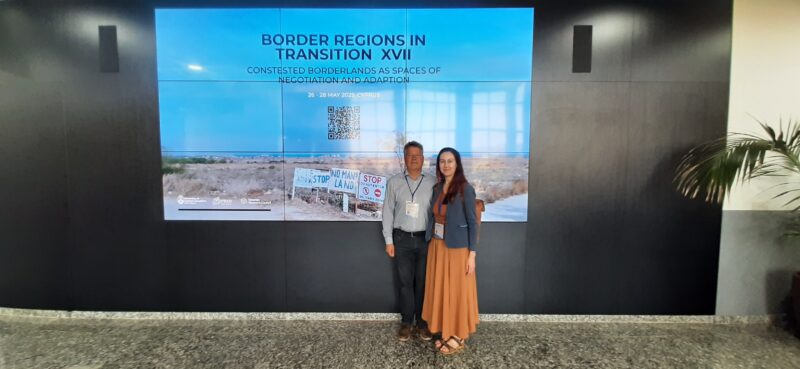
The Eur-Asian Border Lab participated in “Border Regions in Transition XVII,” one of the most important global gatherings in border studies. Held from 25-30 May 2025 at the University of Central Lancashire (UCLan) Cyprus campus in Pyla, a village physically and symbolically located in the UN buffer zone, the conference welcomed 130 scholars to explore the theme Contested Borderlands as Spaces of Negotiation and Adaptation.
Few locations could have been more resonant for such a theme. Pyla is the only village in Cyprus still home to both Greek Cypriot and Turkish Cypriot communities, its coexistence sustained by long-standing negotiations, mutual accommodations, and the soft constraints of international oversight. The geography of the venue itself, just steps from a British military base and surrounded by borders (formal, informal, and imagined), mirrored the core concerns of the conference. How? It raised questions about what it means to live, study, and govern in places of prolonged division.
Alongside panels on phantom borders, environmental frontiers, and legal ambiguities, BRIT XVII gave space to experiences that defy tidy categorisations but remain central to understanding 21st-century borders. Participating in the closing roundtable were the Eur-Asian Border Lab’s Karin Dean and Jussi Laine. The session, Border Scholarship and Societal Impact: A Call for a Post-Critical Shift, was chaired by Laurie Trautman (Border Policy Research Institute, University of Western Washington) and included leading figures in the field such as Anne-Laure Amilhat Szary (L’université Grenoble-Alpes), David Newman (Ben-Gurion University), and James W. Scott (University of Eastern Finland).
The roundtable explored how border research, both individual and collective, can meaningfully engage with today’s global geopolitical issues. Each panellist brought a distinct perspective to the discussion. Karin Dean, for example, believes that most scholars wish to produce research that is relevant and impactful, while the issue is that many of us do not know very well how to do this – and that for some themes it is easier to demonstrate relevance. A problem is also that research impact is often equated with policy relevance. In short, she emphasized that research can be impactful in both ways – contributing to solving ‘big problems’ and helping people such as students, research respondents, members of the public, to connect their experiences to wider structures and power relations that inform their civic and political engagement.
The Eur-Asian Border Lab extends its thanks to the conference organisers for the opportunity to learn and contribute. BRIT XVII offered a space rich in insight and challenge. It reminded us that while borders may divide, border research continues to connect. It brings together disciplines, histories, people, and places.